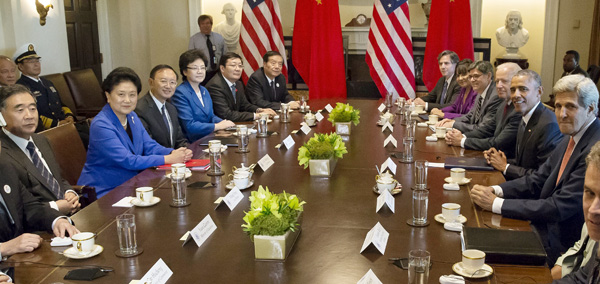 |
|
Strategic and Economic Dialogue principals, including Vice-Premier Wang Yang (first left), Vice-Premier Liu Yandong (second left) and State Councilor Yang Jiechi (third left), meet with US President Barack Obama and members of his Cabinet in the Cabinet Room at the White House in Washington on Sept 2. [Photo/Agencies] |
To control and manage are seemingly the top priorities for handling the differences between China and the United States.
Over the past years, both countries have managed to maintain a comprehensively stable relationship despite the increasing number of structural frictions, even confrontations, on the economic and military fronts. In the economic field, the trade imbalance, the renminbi's exchange rate and non-economic factors hindering mutual investment have become major problems. On the military front, Washington remains suspicious of Beijing's strategic developments, more than once challenging the Chinese government's legal reclamation projects in the South China Sea and introduction of the Air Defense Identification Zone over the East China Sea.
And in terms of freedom of navigation and aviation, the US has repeatedly questioned China's sovereignty over its islets and reefs in the East and South China seas.
Many in China believe the increasingly aggressive US government has relinquished its neutrality in the territorial disputes between China and some of its neighbors by backing the Philippines and Japan.
The China-US bilateral cybersecurity dialogue has been stalled for long and the two sides disagree over cross-border anti-terrorism cooperation. Apart from that, Beijing and Washington have also failed to reach agreements on some non-controversial issues, including the China-led Asian Infrastructure Investment Bank and the recent events to mark the 70th anniversary of the victory in the Chinese People's War of Resistance against Japanese Aggression (1937-45) and World War II.
Incidentally, it was US Ambassador to China Max Baucus, not President Barack Obama, who attended the commemorative events to mark the end of WWII in which the two countries fought together.

I’ve lived in China for quite a considerable time including my graduate school years, travelled and worked in a few cities and still choose my destination taking into consideration the density of smog or PM2.5 particulate matter in the region.